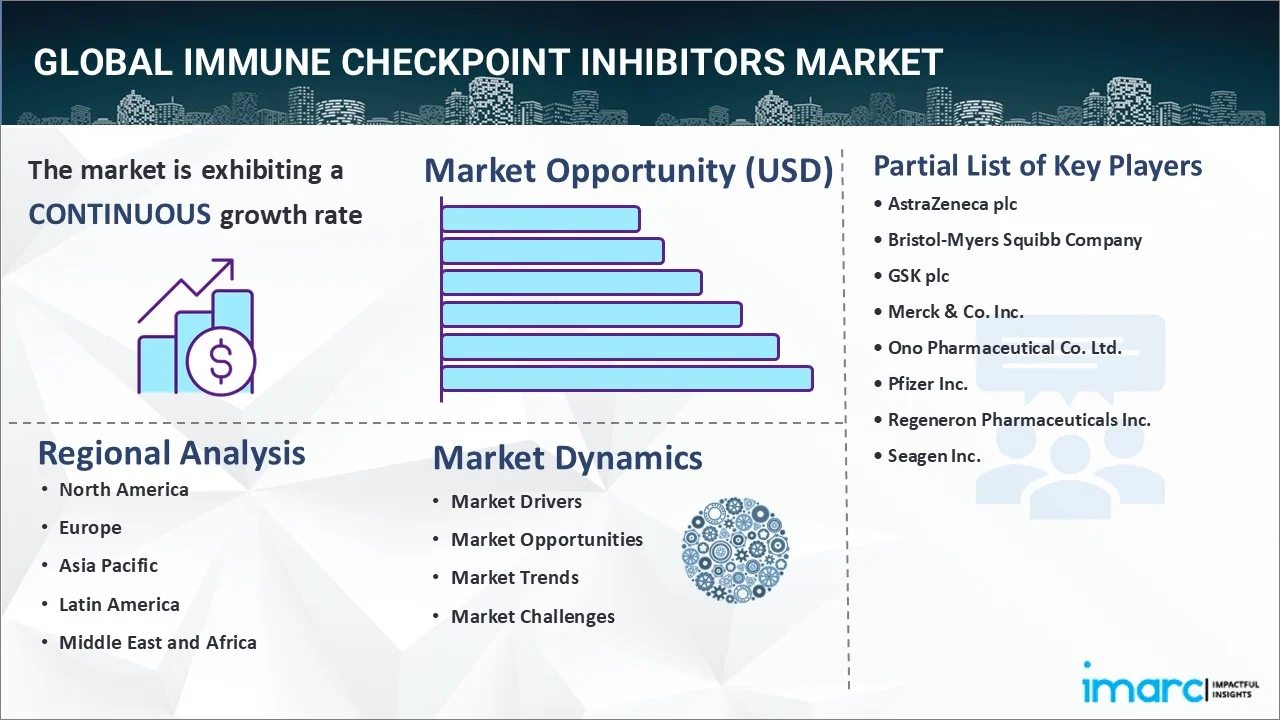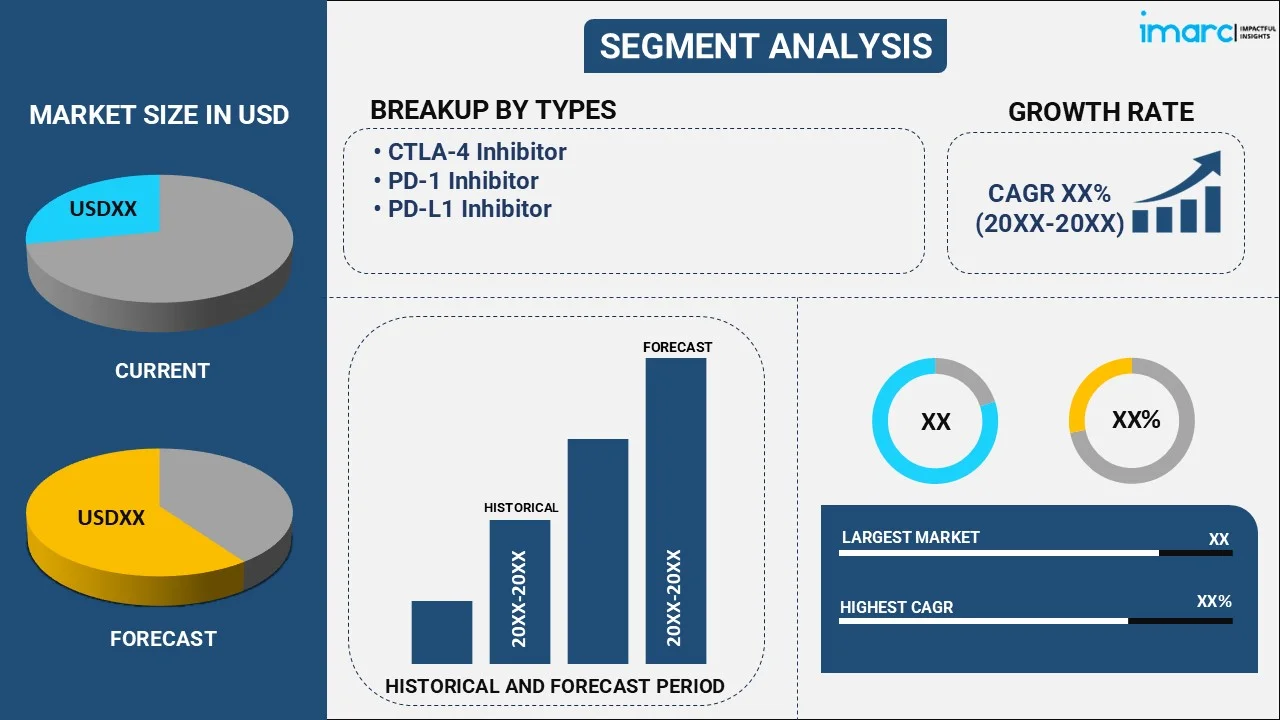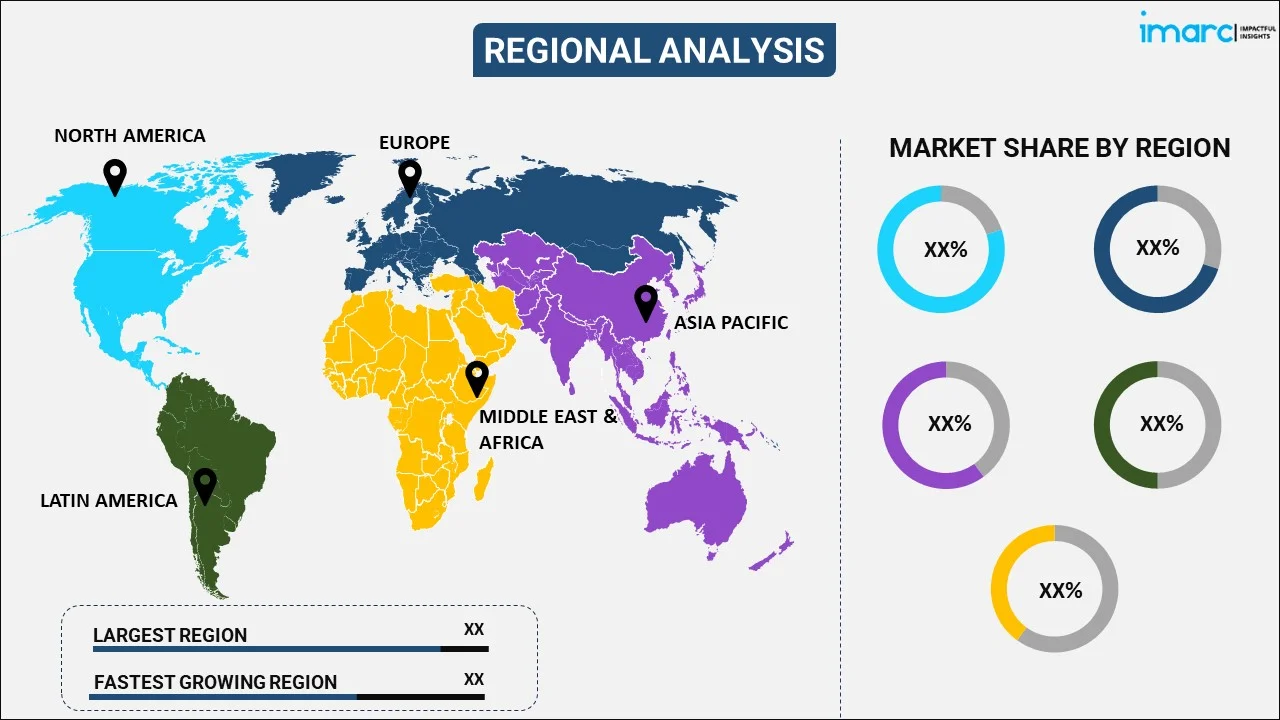
Immune Checkpoint Inhibitors Market Report by Type (CTLA-4 Inhibitor, PD-1 Inhibitor, PD-L1 Inhibitor), Distribution Channel (Hospital Pharmacies, Retail Pharmacies, Online Pharmacies), Application (Lung Cancer, Bladder Cancer, Melanoma, Colorectal Cancer, Hodgkin Lymphoma, and Others), and Region 2025-2033
Market Overview:
The global immune checkpoint inhibitors market size reached USD 49.5 Billion in 2024. Looking forward, IMARC Group expects the market to reach USD 168.6 Billion by 2033, exhibiting a growth rate (CAGR) of 14.6% during 2025-2033. The rising prevalence of various cancers, increasing incidences of respiratory disorders, and the growing preference for personalized medicines represent some of the key factors driving the market.
|
Report Attribute
|
Key Statistics
|
|---|---|
|
Base Year
|
2024
|
|
Forecast Years
|
2025-2033
|
|
Historical Years
|
2019-2024
|
|
Market Size in 2024
|
USD 49.5 Billion |
|
Market Forecast in 2033
|
USD 168.6 Billion |
| Market Growth Rate 2025-2033 | 14.6% |
Immune checkpoint inhibitors are drugs utilized for treating cancer by inhibiting specific proteins made by immune system cells, such as T cells and cancer cells. They are either used alone or in combination with other cancer treatments, such as chemotherapy and radiation therapy to enhance treatment outcomes. They aid in enhancing the quality of life for cancer patients by reducing the symptoms of the disease and extending their survival. Immune checkpoint inhibitors target specific pathways in the immune system, which enables a more targeted approach to cancer treatment. These inhibitors have a lower toxicity profile that leads to fewer side effects and better tolerance to patients as compared to traditional chemotherapy. At present, the rising use of next-generation sequencing technologies that enables the identification of specific genetic mutations in cancer cells is catalyzing the demand for immune checkpoint inhibitors across the globe.

To get more information on this market, Request Sample
Immune Checkpoint Inhibitors Market Trends:
The surging prevalence of various cancers among individuals, such as melanoma, liver, kidney, and gastric, represents one of the major factors driving the demand for immune checkpoint inhibitors around the world. Moreover, the increasing aging population, which is more prone to develop such severe cancers and the rising prevalence of obesity is favoring the market growth. In addition, there is an increase in the incidences of respiratory disorders on account of the rising consumption of alcoholic beverages and tobacco-based products. This, coupled with the growing numbers of weight-related health concerns on account of unhealthy eating habits and sedentary lifestyles, is influencing the market positively. Apart from this, the surging occurrence of various genetic and lifestyle diseases and the increasing awareness among individuals and healthcare professionals about the benefits of early diagnosis and treatment of cancer is propelling the growth of the market. Furthermore, the expanding number of clinical trials by pharmaceutical companies and the rising preference for personalized medicines and new generation drugs and formulations are propelling the growth of the market. Besides this, the growing focus of leading players on strategic collaborations and new product developments to expand their product portfolio and gain a competitive edge is creating a positive outlook for the market. Additionally, significant improvements in medical infrastructure and diagnostic technologies are anticipated to strengthen the growth of the market.
Key Market Segmentation:
IMARC Group provides an analysis of the key trends in each segment of the global immune checkpoint inhibitors market, along with forecasts at the global, regional, and country levels from 2025-2033. Our report has categorized the market based on type, distribution channel, and application.
Type Insights:

- CTLA-4 Inhibitor
- PD-1 Inhibitor
- PD-L1 Inhibitor
The report has provided a detailed breakup and analysis of the immune checkpoint inhibitors market based on the type. This includes CTLA-4 inhibitor, PD-1 inhibitor, and PD-L1 inhibitor. According to the report, PD-1 inhibitor represented the largest segment.
Distribution Channel Insights:
- Hospital Pharmacies
- Retail Pharmacies
- Online Pharmacies
A detailed breakup and analysis of the immune checkpoint inhibitors market based on the distribution channel has also been provided in the report. This includes hospital pharmacies, retail pharmacies, and online pharmacies. According to the report, hospital pharmacies accounted for the largest market share.
Application Insights:
- Lung Cancer
- Bladder Cancer
- Melanoma
- Colorectal Cancer
- Hodgkin Lymphoma
- Others
The report has provided a detailed breakup and analysis of the immune checkpoint inhibitors market based on the application. This includes lung cancer, bladder cancer, melanoma, colorectal cancer, Hodgkin lymphoma, and others. According to the report, lung cancer represented the largest segment.
Regional Insights:

- North America
- United States
- Canada
- Asia Pacific
- China
- Japan
- India
- South Korea
- Australia
- Indonesia
- Others
- Europe
- Germany
- France
- United Kingdom
- Italy
- Spain
- Russia
- Others
- Latin America
- Brazil
- Mexico
- Others
- Middle East and Africa
The report has also provided a comprehensive analysis of all the major regional markets, which include North America (the United States and Canada); Asia Pacific (China, Japan, India, South Korea, Australia, Indonesia, and others); Europe (Germany, France, the United Kingdom, Italy, Spain, Russia, and others); Latin America (Brazil, Mexico, and others); and the Middle East and Africa. According to the report, North America was the largest market for immune checkpoint inhibitors. Some of the factors driving the North America immune checkpoint inhibitors market included the increasing aging population, presence of a well-established healthcare infrastructure, rising research and development (R&D) activities, etc.
Competitive Landscape:
The report has also provided a comprehensive analysis of the competitive landscape in the global immune checkpoint inhibitors market. Competitive analysis such as market structure, market share by key players, player positioning, top winning strategies, competitive dashboard, and company evaluation quadrant has been covered in the report. Also, detailed profiles of all major companies have been provided. Some of the companies covered include AstraZeneca plc, Bristol-Myers Squibb Company, GSK plc, Merck & Co. Inc., Ono Pharmaceutical Co. Ltd., Pfizer Inc., Regeneron Pharmaceuticals Inc., Seagen Inc., etc. Kindly note that this only represents a partial list of companies, and the complete list has been provided in the report.
Report Scope:
| Report Features | Details |
|---|---|
| Base Year of the Analysis | 2024 |
| Historical Period | 2019-2024 |
| Forecast Period | 2025-2033 |
| Units | Billion USD |
| Types Covered | CTLA-4 Inhibitor, PD-1 Inhibitor, PD-L1 Inhibitor |
| Distribution Channels Covered | Hospital Pharmacies, Retail Pharmacies, Online Pharmacies |
| Applications Covered | Lung Cancer, Bladder Cancer, Melanoma, Colorectal Cancer, Hodgkin Lymphoma, Others |
| Regions Covered | Asia Pacific, Europe, North America, Latin America, Middle East and Africa |
| Countries Covered | United States, Canada, Germany, France, United Kingdom, Italy, Spain, Russia, China, Japan, India, South Korea, Australia, Indonesia, Brazil, Mexico |
| Companies Covered | AstraZeneca plc, Bristol-Myers Squibb Company, GSK plc, Merck & Co. Inc., Ono Pharmaceutical Co. Ltd., Pfizer Inc., Regeneron Pharmaceuticals Inc., Seagen Inc., etc. |
| Customization Scope | 10% Free Customization |
| Post-Sale Analyst Support | 10-12 Weeks |
| Delivery Format | PDF and Excel through Email (We can also provide the editable version of the report in PPT/Word format on special request) |
Key Benefits for Stakeholders:
- IMARC’s report offers a comprehensive quantitative analysis of various market segments, historical and current market trends, market forecasts, and dynamics of the immune checkpoint inhibitors market from 2019-2033.
- The research study provides the latest information on the market drivers, challenges, and opportunities in the global immune checkpoint inhibitors market.
- The study maps the leading, as well as the fastest-growing, regional markets. It further enables stakeholders to identify the key country-level markets within each region.
- Porter's five forces analysis assist stakeholders in assessing the impact of new entrants, competitive rivalry, supplier power, buyer power, and the threat of substitution. It helps stakeholders to analyze the level of competition within the immune checkpoint inhibitors industry and its attractiveness.
- Competitive landscape allows stakeholders to understand their competitive environment and provides an insight into the current positions of key players in the market.
Key Questions Answered in This Report
The global immune checkpoint inhibitors market was valued at USD 49.5 Billion in 2024.
We expect the global immune checkpoint inhibitors market to exhibit a CAGR of 14.6% during 2025-2033.
The rising prevalence of various cancers among individuals, such as melanoma, liver, kidney, etc., along with the increasing preference for immune checkpoint inhibitors, as they have a lower toxicity profile that leads to fewer side effects and better tolerance to patients over traditional chemotherapy, is primarily driving the global immune checkpoint inhibitors market.
The sudden outbreak of the COVID-19 pandemic had led to the growing number of R&D activities pertaining to specialty generic drugs for combating the spread of the coronavirus infection, thereby negatively impacting the global market for immune checkpoint inhibitors.
Based on the type, the global immune checkpoint inhibitors market can be divided into CTLA-4 inhibitor, PD-1 inhibitor, and PD-L1 inhibitor. Currently, PD-1 inhibitor accounts for the majority of the total market share.
Based on the distribution channel, the global immune checkpoint inhibitors market has been segregated into hospital pharmacies, retail pharmacies, and online pharmacies. Among these, hospital pharmacies currently hold the largest market share.
Based on the application, the global immune checkpoint inhibitors market can be categorized into lung cancer, bladder cancer, melanoma, colorectal cancer, Hodgkin lymphoma, and others. Currently, lung cancer exhibits a clear dominance in the market.
On a regional level, the market has been classified into North America, Asia Pacific, Europe, Latin America, and Middle East and Africa, where North America currently dominates the global market.
Some of the major players in the global immune checkpoint inhibitors market include AstraZeneca plc, Bristol-Myers Squibb Company, GSK plc, Merck & Co. Inc., Ono Pharmaceutical Co. Ltd., Pfizer Inc., Regeneron Pharmaceuticals Inc., Seagen Inc., etc.
Need more help?
- Speak to our experienced analysts for insights on the current market scenarios.
- Include additional segments and countries to customize the report as per your requirement.
- Gain an unparalleled competitive advantage in your domain by understanding how to utilize the report and positively impacting your operations and revenue.
- For further assistance, please connect with our analysts.
 Request Customization
Request Customization
 Speak to an Analyst
Speak to an Analyst
 Request Brochure
Request Brochure
 Inquire Before Buying
Inquire Before Buying




.webp)




.webp)












